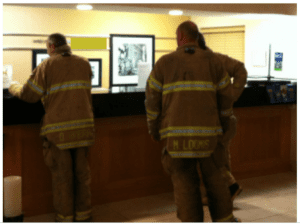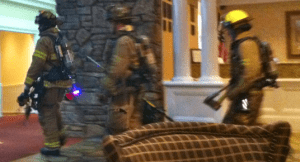 Complacency is a big deal for first responders because it impacts your situational awareness on multiple levels. I would like to give every responder the benefit of the doubt that if or when they have found him or herself being complacent that it wasn’t happening on purpose. In other words, I hope every responder desires to be diligent and alert. Yet, complacency still gets us. I recently had an up close and personal experience with this that I’d like to share.
Complacency is a big deal for first responders because it impacts your situational awareness on multiple levels. I would like to give every responder the benefit of the doubt that if or when they have found him or herself being complacent that it wasn’t happening on purpose. In other words, I hope every responder desires to be diligent and alert. Yet, complacency still gets us. I recently had an up close and personal experience with this that I’d like to share.
 If you follow my Twitter or Facebook updates you know this: I travel. A lot. I’m sort of living my own version of Planes, Trains and Automobiles (except I’m not sharing my bed with John Candy. Nuf said).
If you follow my Twitter or Facebook updates you know this: I travel. A lot. I’m sort of living my own version of Planes, Trains and Automobiles (except I’m not sharing my bed with John Candy. Nuf said).
The popularity of the Mental Management of Emergencies and Fifty Ways to Kill a First Responder Program (as part of the “Get in the Loop” Tour) keeps me nomadic about 200 days of the year. Trust me, that’s not a complaint. I absolutely love sharing my message with first responders. Even more, I love the feedback that the message is making a difference. For that, I thank you very much.
Recently on one of my trips I was startled awake at 2:53am by a fire alarm activation. The alarm only rang about 10 seconds. Knowing what I know about night clerks at hotels, I suspected the alarm had been prematurely silenced. My suspicion was confirmed when I went to the lobby and heard the clerk on the telephone telling someone the alarm panel is indicating the fire pump is running. I was the only patron of the hotel who came to the lobby.
Another False Alarm
As the building was sprinklered and there was no smoke in the lobby, I poured a cup of coffee to see how all of this was going to play out, in part because I was curious and in part because I was angry that the clerk silenced the alarm without investigating the source.
 Then, the fire department arrived. Three firefighters dismounted the engine and entered the lobby and my disappointment with the situation rose to an entirely new level. Every member of the crew had the flaps on their coats open, no helmets, no SCBA, no tools, no water can, no TIC (which, in all fairness they may not have had on that apparatus). They were no more prepared to fight a fire than I would have been if I came down to the lobby wearing Nomex boxer briefs.
Then, the fire department arrived. Three firefighters dismounted the engine and entered the lobby and my disappointment with the situation rose to an entirely new level. Every member of the crew had the flaps on their coats open, no helmets, no SCBA, no tools, no water can, no TIC (which, in all fairness they may not have had on that apparatus). They were no more prepared to fight a fire than I would have been if I came down to the lobby wearing Nomex boxer briefs.
And where were all the other guests? Surely I was not the only person who heard the alarm. But, I was probably the only person in the hotel to have witnessed night clerks silencing alarms to avoid disrupting the slumbering guests.
The Triple Whammy of Complacency
 There were three examples of complacency witnessed in a span of ten minutes.
There were three examples of complacency witnessed in a span of ten minutes.
Complacent Act #1: The night clerk was complacent for silencing the alarm too quickly, assuming the activation to be “another false alarm.”
Complacent Act #2: The patrons of the hotel only heard an alarm that lasted ten seconds, leading them to assume the alarm was just “another false alarm.”
Complacent Act #3: The fire department responded to the alarm with their guard down. Way down. I could tell by their movement, demeanor, comments and attire. For them, this was “another false alarm.”
I didn’t sleep well the rest of the night. As I lay there I imagined how the outcome of this seemingly benign event could have been tragically different if only a few circumstances had changed.
A Culture of Complacency
 Whose job is it to create and nurture a culture that prohibits complacency? Is it the the senior management, training officers, company officers or individual firefighters? I’d say it’s everyone’s job because no one is exempt from the potential consequences. It is evident to me that a complacent co-worker may be more dangerous than any broken piece of equipment on your apparatus. Equipment problems are easy to fix. Repair or replace. But when co-workers have complacent mindsets it can be much more challenging to repair or replace.
Whose job is it to create and nurture a culture that prohibits complacency? Is it the the senior management, training officers, company officers or individual firefighters? I’d say it’s everyone’s job because no one is exempt from the potential consequences. It is evident to me that a complacent co-worker may be more dangerous than any broken piece of equipment on your apparatus. Equipment problems are easy to fix. Repair or replace. But when co-workers have complacent mindsets it can be much more challenging to repair or replace.
The Non-Complacent Fire Alarm Response
 Contrast this to a similar experience I had during a visit to Asheville, North Carolina. During that visit there was also a fire alarm activation in my hotel during the night (This may seem like an odd stroke of bad luck, but keep in mind I spend hundreds of nights in a hotel room). My observations here, however, were VERY different.
Contrast this to a similar experience I had during a visit to Asheville, North Carolina. During that visit there was also a fire alarm activation in my hotel during the night (This may seem like an odd stroke of bad luck, but keep in mind I spend hundreds of nights in a hotel room). My observations here, however, were VERY different.
These firefighters came off the truck with a “working fire” mindset. No complacency to be found here. It was all business. Full gear, SCBA, tools, water, flashlights & TIC. Just as it should be. Kudos to Asheville for setting a great example!
Coincidentally, the hotel clerk did not silence the alarm and the lobby was full of patrons. I suspect that has much to do with Asheville’s Fire Marshals being proactive and educating the desk clerks on how to handle alarm activations.
Chief Gasaway’s Advice
 The problem with complacency is that it can creep into how your department’s members do things in a sneaky, almost unnoticeable away. That is, unnoticeable until some nerdy retired firefighter turned cognitive neuroresearcher happens to be hanging out in the lobby of your hotel when you have a fire alarm. He notices.
The problem with complacency is that it can creep into how your department’s members do things in a sneaky, almost unnoticeable away. That is, unnoticeable until some nerdy retired firefighter turned cognitive neuroresearcher happens to be hanging out in the lobby of your hotel when you have a fire alarm. He notices.
If your mindset leads you to believe you’re responding to ‘just another fire alarm,’ then your guard will be down. Not only can this cause you to be physically under prepared for the potential of the call, it can also cause you to be mentally under prepared for the potential dangers the call holds. Early in my career I was taught to prepare and respond to every call with the mindset that what I will find the worst-case scenario situation and then to get into the mental mindset to be ready for it.
Ironically, as I have so often talked about in my articles, the repetition of physical and mental preparation for the worst case scenario builds both cognitive and muscle memory. This means my mental and physical preparation for all events to be high-potential would become a habit – my automatic scripted, subconscious performance under stress. This would pay off for me, in spades, throughout my career and it will for you too.
Conversely, if the mindset becomes one of complacency. “It’s just another fire alarm” triggers the mind and the body behaves accordingly. In this state of low arousal the senses neither capture nor comprehend clues and cues that can form situational awareness. Being ‘on-guard’ helps improve situational awareness.
During my research I interviewed a commander who responded to ‘just another fire alarm’ to a building they had been to numerous times in the past. His mindset was one of complacency. Arrive and reset. But this time, it was a fire. A significant fire. He described the impact vividly. For those with my Fireground Command Decision Making book, this incident is chronicled on pages 239-240.
This commander admitted having a very difficult time recovering from his complacent mindset and getting ‘geared up’ for the task he was facing. His crew was also complacent, just another fire alarm, mindset which compounded the problem.
Respond to every call for service as if it holds the potential to cause you great harm. Be vigilant in your capturing of clues and cues and understanding what they mean. No responder ever goes to a call thinking it’s going to be their last. But many catastrophic outcomes result from complacent mindsets.
Action Items
 1. Discuss a time when you were complacent on a call and the potential impact it could have had on you or other responders.
1. Discuss a time when you were complacent on a call and the potential impact it could have had on you or other responders.
2. Discuss some specific strategies you use to avoid complacency as a first responder.
3. Discuss some strategies that can be used to help others over the affection of complacency.
4. Discuss with co-workers how you can help each other avoid complacent mindsets.
_____________________________________________________
If you are interested in taking your understanding of situational awareness and high-risk decision making to a higher level, check out the Situational Awareness Matters Online Academy.
CLICK HERE for details, enrollment options and pricing.
__________________________________
Share your comments on this article in the “Leave a Reply” box below. If you want to send me incident pictures, videos or have an idea you’d like me to research and write about, contact me. I really enjoy getting feedback and supportive messages from fellow first responders. It gives me the energy to work harder for you.
Thanks,

Email: Support@RichGasaway.com
Phone: 612-548-4424
Facebook Fan Page: www.facebook.com/SAMatters
Twitter: @SAMatters
LinkedIn: Rich Gasaway
YouTube: SAMattersTV
iTunes: SAMatters Radio


Very nice article. I too have witnessed the just another alarm mentality in a department I worked at some time ago. The crew of the first arriving engine didn’t even bother to don their bunker gear before arriving and found a large warehouse in the early stages. Needless to say it didn’t go well. Can’t understand why we continuously keep doing these things.
Brad,
Thanks for sharing your experiences with fellow readers. It does seem challenging to understand why such things continue to happen. I think it is, in part, because the complacent behavior is repeated over and over and over again and the complacent responder gets away with it. I don’t mean they avoid punishment from superiors. I mean they don’t suffer any physical harm. This gives them a false sense of confidence. They let their guard down.
Rich
Rich,
Another great example of the human brain at work. While this is clearly a situation awareness issue, it is also a failure to lead. The folks in the back are going to do exactly what the boss is doing. Contrast that to PT, diet, language, and overall demeanor. The fact of the matter is that its easy to get dressed, actually, they are 70% there in the picture. But nothing we do is 70%.
Thanks again for the information, it is really appreciated!
Jared,
Great observation… nothing we do is 70%! I love it! And I agree. It is about leadership. What a leader condones, the leader approves.
Thanks for sharing.
Rich
Rich,
Do you know of an incident were premature silencing of a fire alarm during a working fire caused death or injury?
Thanks!